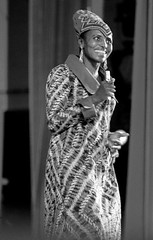
A file photo taken on July 15, 1969 shows South African singer Miriam Makeba performing during the Pan-African Cultural Festival in Algiers.
Originally uploaded by Pan-African News Wire File Photos
Simon Broughton
24.09.10
Next Friday, October 1, Nigeria celebrates 50 years of independence — and lavish celebrations are planned in Abuja and Lagos. Here in London, Nigeria's huge musical legacy is celebrated at the Barbican (on October 6) and a stage musical about Fela Kuti opens at the National Theatre in November. Clearly, one of the great success stories of Africa has been its music — performers such as Fela, Miriam Makeba, Youssou N'Dour and Salif Keita are much better known around the world than most African presidents. Hence a special 18-CD collection called Africa: 50 Years of Music.
In 1960, 17 African countries attained independence, including Mali, Senegal, Congo, Benin and Nigeria, more than any other year. But this box ranges much wider to include 182 artists from 39 countries covering the length and breadth of the continent. It's an impossibly over-ambitious task and, inevitably, one can carp about omissions, but there's a rich reserve of music here that's a delight to explore.
The continent is divided up into six regions — West, Southern, East, Central, North and Lusophone (Portuguese speaking — including Cape Verde, Angola and Mozambique which have a musical character all their own). There are three CDs for each area with tracks compiled chronologically. So West Africa kicks off with ET Mensah's Ghana Freedom, a highlife classic presaging Kwame Nkrumah's declaration that the country was “free forever” in March 1957. It's followed by Super Eagles from Gambia and Bembeya Jazz from Guinea. The first Guinean president, Sekou Toure, didn't do much to encourage democracy but did promote and support a new musical style he christened “authenticité”, in which musicians were encouraged to return to African roots. It became a model for many countries in West Africa, like Mali and Senegal, which is arguably why the region is still so rich in its musical output today.
The North African countries declared or won their independence earlier — the oldest track in the collection is from Oum Kalsoum, who alongside Gamal Abdel Nasser was responsible for the rise in Arab nationalism in the Fifties. Sadly there's no music from Libya, but plenty from Tunisia, Morocco and Algeria (arguably too much from the latter).
Another liberation classic is Independence Cha Cha from Congo's Grand Kalle, which kicks off the Central Africa discs. It highlights the strong influence of Cuban music which persisted for many years. Via Manu Dibango, Franco, Koffi Olomide and Konono No1, the Central African discs come bang up to date with the latest Congolese stars, Staff Benda Bilili.
Southern Africa has always been a powerhouse of music and there are strong offerings from South Africa (including Miriam Makeba and Hugh Masekela, of course), Zimbabwe and Madagascar — a delight for those who don't know any music from the Indian Ocean island. It's a Kenyan track by Fundi Konde, from 1963, their independence year, that opens for East Africa but most come from Ethiopia, a hugely musical country that was never colonised at all.
Africa: 50 Years of Music is out now on the Sterns Music label, £65.
No comments:
Post a Comment